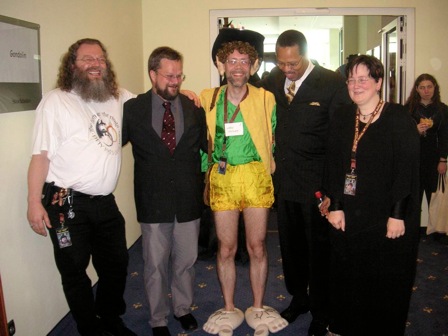Welcher Teil von mir ist im Netz?
„Q: to what extent is it possible to separate the virtual identity from the one in the sensual world?
Only to a very small extent, I guess. I have been heavy into Role Playing Games back in the Nineties and do thus have some experience in assuming roles which are not so different from the roles you take on in Second Life or WoW.
My experience is that these roles are facets of yourself. You take on a specific role. This might or might not correspond to your personality. If, for example, you play a barbarian, I do not think that this necessarily reflects your own inner barbarianism. You might just as well play something which is totally different from your real self. I, though, always somehow ended up playing a bard; even if I started out with a ranger, over the time he became more and more bard-like in behavior and in skills. And I guess that does reflect something of my own personality. So it might be hard to lie in RPGs.
But be that as it may, what you play in RPGs or MMORPGs is a role and as that it never encompasses your whole self, but only facets of it. So the role is a separation from your own being, even if yourself shows through to a big extent. And that is also true for the people you are online. But, for starters, on a physical level your online-self is lacking all the substantialities of your bodyliness, and that makes you something other than your whole self.
You can still take on roles in Facebook and Xing. On Xing for example - which is a business-network - you take on the role of your professional self and more or less suppress aspects which you think are not appropriate for your professional appearance. At least, I guess, this is true for a vast majority of people on Xing or LinkedIn. And though you are more your private self on FB, you play a role there also, albeit that this role might reflect more of your real self than in business. It is even advisable to act strategically on FB since the Net never forgets and in the future you might regret the one behavior or the other if you act purely on impulses.
This leaves us with an un-whole appearance as soon as you enter the online-worlds. You can, of course, appear un-whole in RL, i.e. the sensual world, but in cyberspace you are incomplete if you wish to or not. Even if you would succeed in being your true psychological self online, you would still miss the body and its expressions. Thus you are not whole.
The human psyche, that is at least my belief, is not equipped to really cope with this not being your whole self. You can play your roles on this basis, but you cannot be your true self. Being yourself is on the other hand a necessity for a wholesome community. At least for a special type of community - the sociality in all its richness. This special community needs to allow their participants to be their true selfs. They do not need to show their self, but they need to have the possibility to express it if need be. And to achieve this possibility you need the sensual experiences in all their richness because man is a sensual being which needs to hear, see, listen, smell and touch. Human psyche has need of this sensory part.
Online does not allow for this. So online cannot provide wholesome social community, and that is the sort of community I was referring to in my article. Back then, I spoke of hearth fires. You only experience the value of a hearth fire if you are able to huddle together before it. Second Life, WoW, FB, Xing might constitute rich additions to your life, but a healthy basis in the sensual world is necessary for a complete life. And part of this necessity is real-life-community because man is a social animal. And so I would always advise to never neglect this point. People, especially people born after 1990, which rose up using online-realities all the time, are in danger to forget their physical basis if they overemphasize the value of their online-lives.

Try this online
...
Q: And if it is "separatable" enough, does the
same criteria for forming a relationship, be it
personal or be it creating a community, applies to
the virtual self as it does for the self of the
sensual world? The virtual self lives pretty much its
own life (especially if we take such forms of CMC as
SecondLife), why can't we assign it an option to be a
part of a community?
That´s kind of schizoid, isn´t it? If the online-self
lives in its own world in the sense that it lives in
another world than the physical basis, that sounds
very unhealthy in my ears. But yes, we can assign it
to be part of a community in which we than invest
only a part of our own being. But again, that´s not
our whole self, and wholeness is what man strives
for. The other things are play. It´s okay to play,
but we should stay aware of our whole self.
Q: I have myself experienced cases when the trust
to the virtual identity of a person far exceeds the
trust to the "real" identity
That is a subjective experience of yours which I do
not doubt. But I have not experienced something
alike. Liking someone - yes. Trusting, feeling
friendship to someone I do only know online - no. At
most I sometimes have the feeling after conversing
with someone online that this someone would be a
person I would like to make friends with. But I
cannot before having at least shaken hands.
Maybe, I have to reconsider my point on this aspect,
but I guess, I can´t as long as I do not experience
something alike for myself. Well, taken this way, it
comes down to quantities and one would have to count
opinions: "How do you think about this?"
Q: What criterias or rules (besides those you
already mentioned - trust and friendship) should a
group of virtually closely related,
never-met-in-sensual-world people challenge to say
eventually: we are a community?
Shared experiences might be a way. I guess that for
example the peoples in Iran which stood up against
President Ahmadinedschad, and which were often
organizing over different cities and vast landscapes
by online means, and which in vast numbers might
never have met, that these people might feel a
trusting community. But I guess that these people
also would have at top point of their wish-list the
point "Meet the others!"
Shared experiences do form very reliable bonds and so
they might be a substitute for lacking physical
experiences. One should make this topic of a survey
...
Wahre Gemeinschaften übers Netz?
Gestern erreichte mich dann die Mail einer lettischen Forscherin, die danach fragte, ob ich die Hypothese, dass es keine echten Gemeinschaften, die nur über das Netz organisiert sind, gibt, immer noch aufrecht erhalten würde, und ob ich weitere Argumente dafür oder dagegen gefunden hätte.
Ich denke, meine These stimmt immer noch, und glaube, dass meine Gründe dafür auch Sie interessieren könnten. Deshalb veröffentliche ich hiermit die Antwort auf diese Mail. Schade nur, dass das Kommentarsystem immer noch nicht funktioniert, Ihre Meinung hätte mich sehr interessiert. Mailen Sie sie mir doch.

Selbst etwas bizarre
Freunde treffen sich besser in real life ...
„Dear XXX,
thank you very much for your mail and the interest in
my old article. I will gladly give you an answer to
your question.
But first let me point out that I dropped out of
active research in things online by the turn of the
century. Nowadays I work mostly in ethics and in
literary sciences. So don´t expect a good knowledge
of recent research literature.
But I am very much living with and in social networks
as Facebook, Xing and so on, so I do have a good
practical knowledge. And from this viewpoint, I think
that my thesis from 13 years ago still holds true in
essence. There are no virtual communities which do
have the same quality with regard to parameters like
trust, friendship and tolerance with those in real
life.
Back then I certainly underestimated the role the
Internet would play in every people´s life by the end
of the first decennial of the new millennium. But as
for my thesis this very important role of the Net is
quite interesting, since nowadays there are millions
of people which have connections via net in two ways.
First there are the connections with people with
which they are acquainted, even befriended in real
life, and second there are the people you only know
by wire. The latter may be blokes with which you are
playing online games or customers and employees which
with you commute. And I still guess that a close
relationship is almost always - mind, there might be
exceptions, but I guess they are seldom - possible
only with people you have got to know in RL.
The Net is very well adapted to keep your personal
network close together. Especially those seemingly
meaningless textbits which you post on Twitter and
Facebook often are very meaningful to people which
know you. So you keep everyone important in your life
informed about your general status. (Though there are
people saying that most postings are strategically
and do not tell what really is going on in the psyche
of the poster - but that does not conform with my
observations.) But my guess is, that the meaning of
your tidbits of information are meaningful only to
people you know from RL, and also that these tidbits
do interest only the people you know from RL, but not
the occasional gaming-partner or customer.
There lies a whole world of meaning behind a Tweet
like - let me pick one randomly from my current
Tweetdeck-screen - this: "mmmmm Hubby's going to
surprise us with cinnamon rolls (even a sugar-free
one for me, lol) He spoils us :-P". What do you make
of it without knowing this guy? And wouldn´t you
smile to your self and have a good feeling about your
friend if you knew her, and see that she obviously
expects a good afternoon? There is very much meaning
in this white noise of the Net, but only if you care,
and you cannot really care for the 501 anonymous
members of your gang in Mafia Wars or the totally
virtual neighbours in Farmville.
I basically did not come up with additional
arguments, but with additional observation, though
only on a strictly subjective and personal scale. If
anyone would want to test my old hypotheses, now
would be the time and I would advise to inquire into
the two different groups of online-acquaintances as a
measure for testing and observation.
Hope that helped, good luck with your work.
All the best,
Frank“
Es gibt nur eine (relevante) Realität
Ruch - selbst "begeisterter" Facebook-Nutzer, wie er schreibt - beobachtet klug, welche immer weiter zunehmende Bedeutung soziale Netzwerke im privaten wie auch im öffentlich-politischen Leben haben. Nur kann er es, wie der in Mediendingen hypertrophe Norbert Bolz und viele andere Intellektuelle und Wissenschaftler, nicht lassen, aus der Nutzung sogenannter virtueller Realitäten weitestgehende - und unhaltbare - ontologische Schlüsse zu ziehen.
Am Beispiel von Facebook "zeigt sich", so Ruch, "einmal mehr, dass die Grenze zwischen Realität und Simulation verschwimmt."
Ja, hört man immer wieder.
Ist auch nachvollziehbar.
Ist aber trotzdem falsch.
Nicht eine ontologisch gegebene Grenze zwischen Realitäten verschwimmt, sondern allenfalls die Wahrnehmnung derselben - und dagegen kann man leicht etwas tun, wenn man denn will.

Nicht an der Nase
rumführen lassen!
Aus einer zutreffenden
Betrachtung der im Gehirn stattfindenden
Informationsverarbeitung zieht Ruch den Schluss, dass
die Unterscheidung zwischen Realität und Simulation
keinen Sinn mache, und das stimmt in ontologischer
Hinsicht wiederum, da muss man ontologisxch nix
unterscheiden, man muss nur den jeweiligen Status
kennen, also wissen, was Simulation ist und wa
snicht, um sich nicht zu verirren. Wurzlen tut dies
aber alles in unserem schnöden ollen Universum.
Es besteht die Möglichkeit der faktischen Existenz
verschiedener Realitäten, aber die für uns
physiologisch erfahrbaren, die Realitäten also, die
wir sinnlich erfahren können, mit Auge, Ohr,
Tastsinn, Zunge und Nase sind nur eine einzige
Realität. Fraglich ist sogar, ob wir geistig
überhaupt so ausgestattet sind, das wir gedanklich
und praktisch mit multiplen Realitäten zurechtkommen
könnten. Das aber für uns nur ein Universum da ist,
das deshalb auch zurecht so heißt, trifft auch für
die von Computern erzeugten Pseudorealitäten zu.
Das ist natürlich prosaischer und viel weniger
geheimnisvoll als das Gerede von multiplen Realitäten
und deren Auswirkung auf unsere Befindlichkeit. Dass
es nur eine Realität gibt, mit und in der wir
agieren, ist eine Wahrheit, die einmal darzulegen
genügt. Das aber macht es schwierig, Dutzende von
Artikeln und Bücher zu schreiben. Raunt man hingegen
wie Herr Bolz, "das Wirkliche verschmilzt mit seinem
eigenen Bild", lässt sich trefflich multipublizieren.
Besteht nur die Gefahr, die Theoreme durcheinander zu
bekommen (Das Wirkliche? - hatten 'wir'
Postmodernisten das nicht abgeschafft?), aber auch
daraus gibt es immer einen publizistischen Ausweg.
Die Wirklichkeit ist also "nicht mehr hinter den
Bildern zu finden, sondern allein in ihnen", so
wieder Bolz (dem Herrn ist, wie gesagt, schwer zu
entkommen)? Das kann man jetzt natürlich so und so
ausführen; sich mal auf ontologische Multiplizismen
verlegen und mal gesagt haben wollen, "dass die
Medienwirklichkeit" unsere "Erfahrung und
Weltwahrnehmung diktiert"; wobei ersteres Unsinn,
letzteres aber gar nicht so falsch ist. Nur wie
meinen 'wir' Postmodernisten es denn jetzt?
Wir sollten uns zumindest erst einmal darauf einigen,
dass es nur eine Realität gibt, zu der wir Zugang
haben und die zu uns Zugang hat (was schon alles über
die Relevanz anderer Realitäten aussagt). Computer
sind gänzlich von dieser Welt; die Programme, die auf
ihnen laufen, sind von weltlichen Personen mühsam von
Hand geschrieben worden (IF, NOT, OR ...) und die
virtuellen Welten von Facebook werden von weltlichen
Personen bevölkert. Und selbst wenn sich irgendwann
eine KI darunter mischen sollte, dann ist auch die
von weltlichen Personen zusammengebaut worden und zum
weltlichen Bestandteil unserer einen Realität
geworden.

Jedis in Bochum? Ja, aber
diese Fremden sind auch nur von
hier.
Selbst die unheimlichen
Realitäten (den Pädagogen unheimlich) von "World Of
Warcraft" und "Herr der Ringe Online" sind schnöde,
von weltlichen Personen erdachte Geschichten, deren
Verwurzelung in uns weltlichen Menschen sogar
besonders tief ist, leben sie doch in der Regel von
den Mythen und Archetypen, die uns seit Jahrtausenden
begleiten.
Womit ich nicht sagen will, dass das alles
unproblematisch wäre. Das ist es keinesfalls:
Datenschutz, Suchtgefahr, Mobbing, Missbrauch,
Kriminalität, Überwachungsstaat - es gibt keine
Gefahr oder Perversion, die es nicht auch in den
Netzen gäbe.
Nur eine Gefahr, die besteht bei Einsatz des gesunden
Menschenverstandes nicht: Dass man sich in
verschiedenen Realitäten verlieren (oder dorthin
fliehen) könne. Ist auch besser so, wir sind mit der
einen Wirklichkeit ja schon überfordert.


